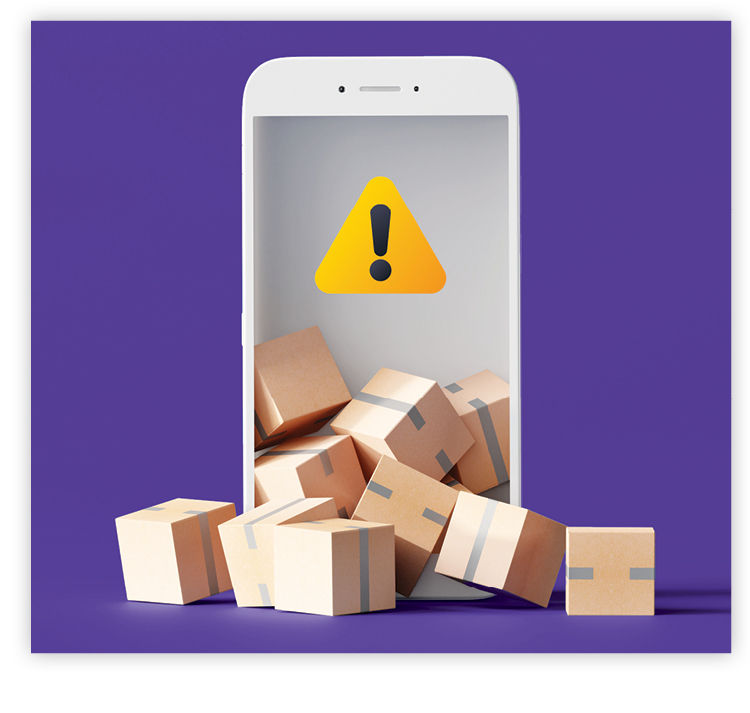CUSTOMER ALERT – SCAM MESSAGES CLAIM TO BE FROM AMAZON
 In 2022, the Better Business Bureau reported 202 scams related to Amazon Prime and 186 scams that mention Amazon “account deletion, suspension, closure, or locking.” These scams continue to be common, so be suspicious if you receive a message that claims to be from Amazon.
In 2022, the Better Business Bureau reported 202 scams related to Amazon Prime and 186 scams that mention Amazon “account deletion, suspension, closure, or locking.” These scams continue to be common, so be suspicious if you receive a message that claims to be from Amazon.
One of the top scams now is the “Suspicious Activity Scam.” You receive an email or text saying Amazon has suspended or deleted your account due to suspicious activity. You’ll then be asked to “verify your account” by providing your login and password or payment information.
Another scam to watch out for is the “Fake Order Confirmation” message. It refers to a purchase that you didn’t make and says you need to click a link — which is fraudulent and malicious — to confirm or cancel the order.
Amazon recommends these actions to help protect yourself from scams:
Verify your purchases on Amazon. If you receive a message about a purchase, don’t respond to the message or click any link. Instead, log in to your Amazon account or go on your Amazon app to confirm the purchases you’ve made or not made.
Use Amazon first. No matter what the message or call says, use Amazon’s website or app to verify what’s going on.
Don’t give away your information. Amazon doesn’t ask for payment over a phone call, text, or email. It will only ask for payment through the app or on the website.
Be wary of urgency. Scammers will try to create a sense of urgency to persuade you to do what they’re asking without thinking about it.
Research it. If you get a message or call that strikes you as out of the ordinary, type it into Google or your search engine to see if anyone else has reported a similar situation. You can also look it up on Amazon’s website or the Better Business Bureau’s Scam Tracker page.
Contact Amazon. If you’re unsure of what’s being sent to you, stop engaging completely. Contact Amazon directly through the website or app. Do not use an email address or phone number that’s in the suspicious message.
 In 2022, the Better Business Bureau reported 202 scams related to Amazon Prime and 186 scams that mention Amazon “account deletion, suspension, closure, or locking.” These scams continue to be common, so be suspicious if you receive a message that claims to be from Amazon.
In 2022, the Better Business Bureau reported 202 scams related to Amazon Prime and 186 scams that mention Amazon “account deletion, suspension, closure, or locking.” These scams continue to be common, so be suspicious if you receive a message that claims to be from Amazon.
One of the top scams now is the “Suspicious Activity Scam.” You receive an email or text saying Amazon has suspended or deleted your account due to suspicious activity. You’ll then be asked to “verify your account” by providing your login and password or payment information.
Another scam to watch out for is the “Fake Order Confirmation” message. It refers to a purchase that you didn’t make and says you need to click a link — which is fraudulent and malicious — to confirm or cancel the order.
Amazon recommends these actions to help protect yourself from scams:
Verify your purchases on Amazon. If you receive a message about a purchase, don’t respond to the message or click any link. Instead, log in to your Amazon account or go on your Amazon app to confirm the purchases you’ve made or not made.
Use Amazon first. No matter what the message or call says, use Amazon’s website or app to verify what’s going on.
Don’t give away your information. Amazon doesn’t ask for payment over a phone call, text, or email. It will only ask for payment through the app or on the website.
Be wary of urgency. Scammers will try to create a sense of urgency to persuade you to do what they’re asking without thinking about it.
Research it. If you get a message or call that strikes you as out of the ordinary, type it into Google or your search engine to see if anyone else has reported a similar situation. You can also look it up on Amazon’s website or the Better Business Bureau’s Scam Tracker page.
Contact Amazon. If you’re unsure of what’s being sent to you, stop engaging completely. Contact Amazon directly through the website or app. Do not use an email address or phone number that’s in the suspicious message.


